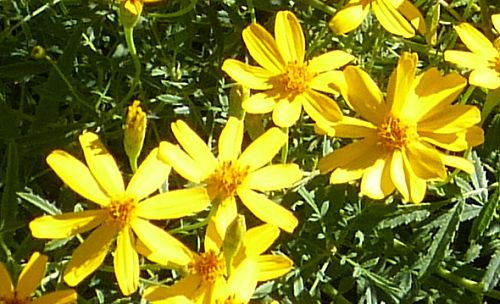Growing Tagetes lemmonii:
Lemmon's Marigold
Description
Form: Herbaceous stems growing from a woody base (subshrub).
Leaf retention: Evergreen, but leaves and stems may die back somewhat in temperatures below freezing.
Growth rate: Moderate to rapid depending on temperature and water.
Mature Size: 3-8' (0.9-2.4m) high, 4-8' (1.2-2.4m) wide.
Flowers: Sometimes clustered, up to 2" (5cm) wide. Yellow rays surround a center disc of orange florets,
Bloom: Sporadically, fall, mid-winter, and spring.
Fruit: Each floret produces a tiny, hard dried fruit enclosing a single seed (cypsela).
Leaves: Narrow, green, finely-toothed margins, 2-3" (5-7.6cm) long, with a strong aroma, sometimes described as citrus-like, either loved or hated.
Stems: Green, flexible.
Roots: Clumping.
Wildlife: The flowers attract bees, and can attract butterflies in part shade. The seeds attract birds. The foliage is avoided by browsing mammals.
Toxic / Danger: No.
Origin: Arizona and Mexico.
Form: Herbaceous stems growing from a woody base (subshrub).
Leaf retention: Evergreen, but leaves and stems may die back somewhat in temperatures below freezing.
Growth rate: Moderate to rapid depending on temperature and water.
Mature Size: 3-8' (0.9-2.4m) high, 4-8' (1.2-2.4m) wide.
Flowers: Sometimes clustered, up to 2" (5cm) wide. Yellow rays surround a center disc of orange florets,
Bloom: Sporadically, fall, mid-winter, and spring.
Fruit: Each floret produces a tiny, hard dried fruit enclosing a single seed (cypsela).
Leaves: Narrow, green, finely-toothed margins, 2-3" (5-7.6cm) long, with a strong aroma, sometimes described as citrus-like, either loved or hated.
Stems: Green, flexible.
Roots: Clumping.
Wildlife: The flowers attract bees, and can attract butterflies in part shade. The seeds attract birds. The foliage is avoided by browsing mammals.
Toxic / Danger: No.
Origin: Arizona and Mexico.
Cultivation and Uses
USDA hardiness zones: 8-10.
Heat tolerant: Not above 100°F (38°C) when it will need all day part shade and extra water.
Drought tolerant: Yes.
Sun: Full sun to part shade, especially afternoon part shade, in high temperature deserts. This plant will get leggy and have fewer blooms with too much shade.
Soil: Well draining, dry, pH 6.6-8.5 (neutral to alkaline).
Water once established: Monthly in winter to weekly in high temperature summers. Too much water causes leggy growth requiring pruning.
Mulch: Use organic mulch, to protect the root zone, where temperatures drop below 10°F (-12.2°C).
Prune: Early spring, and early winter, prune stems back, but no more than half height. Remove dead wood.
Litter: Low.
Propagation: Root division, cuttings, seed.
Uses: Ornamental.
USDA hardiness zones: 8-10.
Heat tolerant: Not above 100°F (38°C) when it will need all day part shade and extra water.
Drought tolerant: Yes.
Sun: Full sun to part shade, especially afternoon part shade, in high temperature deserts. This plant will get leggy and have fewer blooms with too much shade.
Soil: Well draining, dry, pH 6.6-8.5 (neutral to alkaline).
Water once established: Monthly in winter to weekly in high temperature summers. Too much water causes leggy growth requiring pruning.
Mulch: Use organic mulch, to protect the root zone, where temperatures drop below 10°F (-12.2°C).
Prune: Early spring, and early winter, prune stems back, but no more than half height. Remove dead wood.
Litter: Low.
Propagation: Root division, cuttings, seed.
Uses: Ornamental.
Comments
Tagetes lemmonii is a member of the Daisy family (Asteraceae). Another common name is Mountain Marigold. This plant is named after John Lemmon and his wife, botanist Sara Plummer Lemmon, who discovered the plant on Mt. Lemmon (named after Sara) on the north side of Tucson, Arizona. The butterfly is a Texan Crescent.
Do you have additional information or a different experience for these plants that you would like to share? Email info@GardenOracle.com. All contributions are welcome and appreciated.
Tagetes lemmonii is a member of the Daisy family (Asteraceae). Another common name is Mountain Marigold. This plant is named after John Lemmon and his wife, botanist Sara Plummer Lemmon, who discovered the plant on Mt. Lemmon (named after Sara) on the north side of Tucson, Arizona. The butterfly is a Texan Crescent.
Do you have additional information or a different experience for these plants that you would like to share? Email info@GardenOracle.com. All contributions are welcome and appreciated.



Latest update: September, 2024
© 2008-2026 by GardenOracle.com

